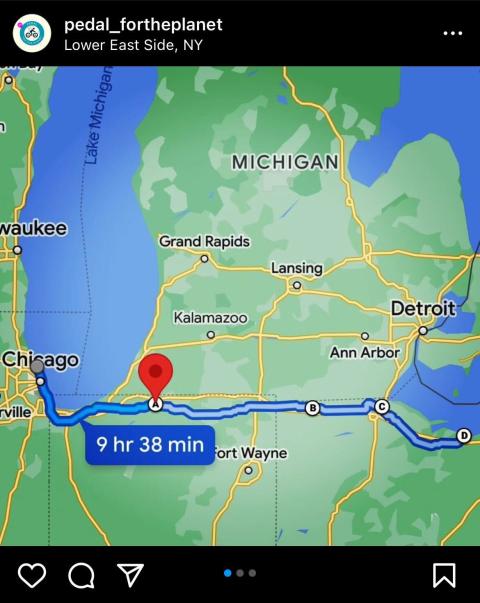Activists mark the start of Climate Week in New York City Sept. 17, 2023, during a demonstration calling for the U.S. government to take action toward ending fossil fuel use in order to reduce the impact of global climate change. (OSV News/Reuters/Eduardo Munoz)
In what is thought to have been the largest climate change rally since 2019, an estimated crowd of as many as 75,000 demonstrators from some 700 organizations and activist groups paraded through the streets of New York City Sept. 17 in the "March to End Fossil Fuels."
Colorful banners, flags and placards — some professionally printed, some handmade, but all urging immediate change — accompanied the sea of protesters as they processed through midtown Manhattan.
Among them were numerous Catholic groups — including Catholic Climate Covenant; Laudato Si' Movement; Metro NY Catholic Climate Movement; Altagracia; Pax Christi; Franciscan Action Network; Sisters of Charity; Sisters of Mercy; and Iona University students — contributing their voices to a growing chorus of global alarm that has been energized by the witness of Pope Francis' outspoken climate declarations.
On Oct. 4 — the feast of St. Francis, the patron saint of ecology — the pontiff publishes a follow-up to his landmark 2015 environmental encyclical, "Laudato Si'."
Scheduled to closely coincide with the United Nations' Sept. 20 "Climate Ambition Summit," the March to End Fossil Fuels aimed to capture the attention not just of American politicians — and in particular, President Joe Biden — but also world leaders descending upon the U.N.'s New York headquarters for the summit.
Advertisement
The "Climate Ambition" gathering — convened by U.N. Secretary-General António Guterres — is designed "to accelerate action by governments, business, finance, local authorities and civil society, and to hear from 'first movers and doers,'" according to a U.N. statement.
"(Guterres) put that word 'ambition' in there because he has said — looking at what's happening around the world and how we're already experiencing climate change — that if countries are not coming with a plan to reduce their emissions, they shouldn't come to the summit," said Nancy Lorence, chapter coordinator for Metro New York Catholic Climate Movement. "So that was a pretty strong statement."
Lorence explained, "The whole idea of the rally is to also raise up the voice of civil society and say to the leaders that are coming to the summit, 'Yes — get going. We need you to act on this crisis — and we need you to consider it a crisis."
Marchers also called upon Biden to halt fossil fuel expansion and extraction, including the Willow Project in the Arctic, leases in the Gulf of Mexico and the Mountain Valley Pipeline in Virginia and West Virginia.
An Indigenous woman gestures as activists mark the start of Climate Week in New York City Sept. 17, 2023, during a demonstration calling for the U.S. government to take action toward ending fossil fuel use in order to reduce the impact of global climate change. (OSV News/Reuters/Eduardo Munoz)
Fossil fuels such as coal, oil and gas are considered key contributors to global warming.
The U.N. has stated that "the world needs immediate and deep reductions in emissions now, and over the course of the next three decades, to limit global warming to 1.5°C degrees above pre-industrial levels and prevent the worst impacts."
The summer of 2023 repeatedly grabbed news headlines with a succession of climate disasters, including historic heatwaves in the U.S., Europe and Middle East; ravaging wildfires in Canada and Maui; and devastating flooding in China, Brazil and Libya.
Prior to the march — and following morning Mass at St. Paul the Apostle Church on West 59th Street — Catholic Climate Covenant's Youth Mobilization program, led by Kayla Jacobs, held a press conference on the steps of St. Paul featuring six young Catholics who shared their concerns with a gathered crowd of supporters.
"I believe it is our collective responsibility — especially as young people — to engage in conversations and bring awareness about the environmental issues that affect not only our generation, but generations to come," said Zoe George, a high school senior at New York's Dominican Academy.
Activists mark the start of Climate Week in New York City Sept. 17, 2023, during a demonstration calling for the U.S. government to take action toward ending fossil fuel use in order to reduce the impact of global climate change. (OSV News/Reuters/Eduardo Munoz)
"While climate change is a complex issue, what is not complex is its impact on vulnerable communities. The poor are often the hardest hit by climate-related disasters, including the risk of extreme weather patterns, food scarcity and health issues," George commented. "These communities often lack the resources and infrastructure to protect themselves. Therefore, climate change is not just an environmental challenge, but a humanitarian crisis."
Daniel Bajada — a uniformed Scout and class of 2024 Regis High School student — echoed George's concerns for the poor.
"While these recent wildfires kept us New Yorkers inside for a few days, climate tragedies in the Global South force people out of their homes, displacing millions and forcing the most vulnerable to suffer," Bajada said. "As the youth, this world will soon be ours to live in — we must spearhead the movement to defend our planet."
One march participant — Luke Henkel, 33, North American programs coordinator for Laudato Si' Movement — biked almost 1,100 miles to New York City from his Chicago hometown.
The trip — which Henkel said he viewed as a pilgrimage — took 18 days.
"Looking at a map, I'm just like, 'Wait — I did that, on a bike?,'" Henkel told OSV News. "It feels unreal."

A screenshot of an Instagram post from @pedal_fortheplanet shows Luke Henkel's cycling route from Chicago to New York City. (EarthBeat screenshot)
Henkel set up an Instagram page for his journey — "Pedal for the Planet" — which was flooded with messages from well-wishers.
"I just wanted to do a zero-pollution bike trip," said Henkel, who at one point found himself biking on an abandoned New York City street — only moments later to realize it had been emptied of traffic to accommodate Biden's motorcade, which soon swept by.
"This is my way of saying, 'This is how we can transform our culture.' I would love for us to be able to get around without polluting," Henkel added. "For me, I was just trying to impress on people that you should not go to this march expecting all these problems to go away tomorrow. ... Just find what's in your heart, and go do that. Don't worry about the rest; don't try to save the world. Just pay attention to what God is saying."
"That's what gives me hope," said Lorence. "When I see young people that are coming out very concerned about this, and willing to do something about it; willing to invest some time and energy into calling for a new kind of reality."
After the press conference, the assembled crowd joined the larger contingent of marchers on 53rd Street for interfaith prayer.
An Indigenous man holds a sign as activists mark the start of Climate Week in New York City Sept. 17, 2023, during a demonstration calling for the U.S. government to take action toward ending fossil fuel use in order to reduce the impact of global climate change. (OSV News/Reuters/Eduardo Munoz)
"We are subsidizing what is destroying us," Mary Robinson, former president of Ireland and now an active climate campaigner, told the pre-march press multitude, as she denounced the estimated $7 trillion the International Monetary Fund reports governments worldwide spent in the previous year to drill for oil and gas.
When the march concluded at First Avenue and 49th Street, a rally stirred the protesters to continued action. Speakers included U.S. Rep. Alexandria Ocasio-Cortez, D-N.Y., who told the crowd "the way we create urgency is to have people around the world in the streets."
Millions more also marched in other countries and cities, including Austin, Texas.
"This is a moral issue," said Linda Sandish, a Laudato Si' Movement Creation Care Team Leader at St. Thomas More Catholic Church in Austin who helped organize "Rally for the Climate Emergency!" on the steps of the Texas Capitol.
Over a hundred activists turned out in punishing heat to hear speakers including U.S. Rep. Lloyd Doggett, D-Texas.
Sandish cautioned against partisan interpretations of the climate crisis.
"It's not a political issue, other than our politicians need to do something about it," Sandish emphasized. "It's wrong to be killing our earth."








